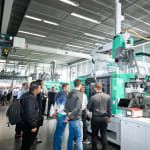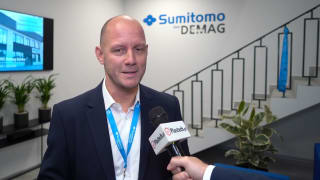
At Fakuma 2024, an exciting two-component application will showcase Arburg’s dominance over sophisticated processes like LSR and multi-component injection moulding and automation. At the Arburg stand 3101 in Hall A3, an Allrounder More 2000 will be processing thermoplastics (PBT) and liquid silicone (LSR) to create food-safe spatulas that are ready for use. The intelligent assistance functions of the Gestica control system ensure optimum cycle time and energy efficiency. A Yaskawa six-axis robot handles the injection moulding process.
A pioneer in multi-component injection moulding, Arburg has a special series in its range: the Allrounder More is designed for the production-efficient injection moulding of high-quality plastic parts, in this case in a hard/soft combination.
Allrounder More: More space, modularity and convenience
The machines from the More series offer more space for larger moulds, rotary units, media connections and a usable ejector stroke. Thanks to their highly modular design and many optimised features for greater ease of use and simple maintenance, they can be adapted very flexibly to the respective customer and market requirements. This means that with the Allrounder More, different types of processes can be combined with little effort and all common multi-component applications can be realised. As standard, the machines feature a highly dynamic electric toggle-type clamping unit with energy-efficient liquid-cooled servo motors, two electric injection units and a choice of 1,600 or 2,000 kN clamping force.
Two-component spatula made of thermoplastic and silicone
A fully electric Allrounder More 2000 with a clamping force of 2,000 kN in the "Ultimate" performance variant will be used at Fakuma 2024. The two-component machine processes thermoplastic (PBT) and liquid silicone rubber (LSR) to create the kind of food-safe spatulas used for home baking. The machine is equipped with two electric injection units, s 170 and 400. With the smaller vertical injection unit, the handle is made of food-grade PBT (from BASF). The pre-moulded part rotates from the upper to the lower finishing station in the 1+1-cavity mould from Polarform via a servo-electro index unit with motor from Arburg’s sister company AMKmotion. A horizontal injection unit is used to overmould the soft spatula component made of a non-tempered LSR (Wacker).

The two components are injected directly and with no waste. A hot runner system is used for the PBT handle, while overmoulding with LSR is done by a servo-electric cold runner with a needle valve from Ewikon.
The downstream cooling station sees the spatulas cooled down in a defined and precise manner. Surface structures are then accurately applied by a Rea laser station and, finally, the spatulas are deposited on a conveyor belt by a Yaskawa six-axis robot. Thanks to the systematic selection of materials and the automated process, the end product is ready for use in a cycle time of around 60 seconds. The spatulas in a hard/soft combination are suitable for use with food.
Central Gestica control system for optimised processes
The Yaskawa six-axis robot "powered by Arburg", which is integrated into the Gestica’s controller technology, can be programmed quickly and easily via the machine controller similar to a linear Multilift robot system. Temperature control units and other peripheral equipment can also be integrated. Including the LSR dosing unit from Elmet, which communicates with Gestica via the Euromap interface 82.3. Assistance functions in the control system ensure optimum cycle time and energy efficiency for the injection moulding process. The “aXw Control CycleAssist” function makes sure the control system knows the programmed cycle. The function graphically compares the current times of each cycle step with previously defined reference values. Unproductive time segments can be displayed and the sequence optimised by a single click. This results in short cycle times and high productivity. In addition, the "aXw Control EnergyAssist" combines all the key functions of the plasticising cylinder and mould. This ensures optimised switching on and off of all heating zones, significantly reduces the energy requirement in the heating phase and achieves energy-efficient production.



